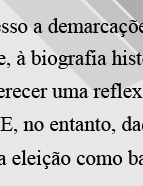

................................
This kind of communion between past and present, which can be detected in the common way by which the same author outlines the profiles of characters from yesteryear and his own time, was dictated by two notions that dominated the Portuguese intellectual scene for most of the 19th century and beyond: that of the nation, a metahistorical entity towards which past and present actions converged, and that of the great man - of interest here - a concept which, although less restricted than that of the hero, broadened the criteria that determined who was worthy of portrait honours. (L. Câmara Leme, Emilia das Neves, 1875, p.5; A.F. Castilho, “Emilia das Neves e Sousa”, 1860, pp.197-99).
Due to the adherence to these common denominators, as well as the essentially similar way historical and contemporary figures were approached and judged, it is not possible to untangle the steps taken by historical biography in particular from those taken by the biographical genre in general (namely literature dedicated to portraying illustrious men). Moreover, it was the growing attention to recent history, if not strictly contemporary, that primarily promoted the encounter between academia and the general public and thus, to a large extent, determined the trajectory and success of nineteenth-century biographical historiography. This attraction to contemporaneity was not always predominant. In a significant number of cases, even among those with a parallel political activity, the more remote past remained the main focus of interest, as seen in Luciano Cordeiro, Conde de Sabugosa, and José Silvestre Ribeiro. However, it found many adherents among legitimate historians and even brought together efforts from academics and other writers, especially through collaboration in more or less specialised periodicals. For instance, in 1870, Luís Rebelo da Silva published the Varões ilustres das três épocas constitucionais [Illustrious men of the three contemporary eras] compiling articles previously published in periodicals. A substantial portion of these news items, accompanied by portraits, had appeared in the Revista contemporânea de Portugal e Brasil [Contemporary Journal of Portugal and Brazil] (RCPB), where authors from diverse backgrounds such as Latino Coelho, Pinheiro Chagas, António Feliciano de Castilho, Inocêncio da Silva, Mendes Leal, Júlio César Machado, and Teixeira de Vasconcelos had participated, all engaged in writing biographical works and most of them with studies on figures from the more distant past.
